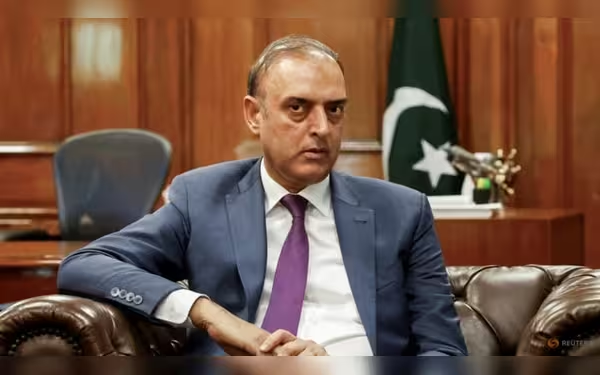Thursday, November 7, 2024 05:31 AM
Pakistan Central Bank Cuts Key Policy Rate by 250 Basis Points
- Record 250 basis points cut in policy rate announced.
- Inflation drops to 7.2% from nearly 40% in May.
- IMF approves $7 billion facility to support economy.
 Image Credits: channelnewsasia
Image Credits: channelnewsasiaPakistan's central bank cuts key policy rate by 250 basis points to stimulate economic growth amid declining inflation rates.
KARACHI: In a significant move to stimulate its economy, Pakistan's central bank has announced a record cut in its key policy rate by 250 basis points, bringing it down to 15 percent. This decision, made on Monday, has surpassed the expectations of many analysts who had predicted a reduction of 200 basis points. The central bank's action comes as the country grapples with a sluggish economy and a notable decline in inflation rates.
Inflation in Pakistan has seen a dramatic drop, falling to 7.2 percent in October from a staggering multi-decade high of nearly 40 percent in May 2023. This sharp decline has prompted the finance ministry to forecast that inflation could further decrease to between 5.5 percent and 6.5 percent in November. The central bank has now reduced interest rates by a total of 700 basis points since June, implementing four consecutive cuts aimed at fostering economic growth.
The State Bank of Pakistan (SBP) has justified this latest rate cut by stating that the current monetary policy is well-suited to achieve price stability and maintain inflation within the target range of 5 to 7 percent. The SBP emphasized that this approach will not only support macroeconomic stability but also help in achieving sustainable economic growth.
During a briefing following the announcement, Central Bank Governor Jameel Ahmad reassured analysts that bilateral partner countries have committed to rolling over their debts as part of Islamabad's ongoing bailout program with the International Monetary Fund (IMF). In September, the IMF approved a crucial $7 billion facility for Pakistan, which is set to last for 37 months, providing a much-needed boost to the country's struggling economy.
Despite not providing updated figures, the central bank anticipates that the average inflation rate for the fiscal year ending in June 2025 will be significantly lower than the previously forecasted range of 11.5 to 13.5 percent. Additionally, GDP growth for the current fiscal year is expected to exceed earlier predictions, although it will still fall within the targeted range of 2.5 to 3.5 percent.
Adnan Sheikh, an assistant vice president at Pak Kuwait Investment Company, remarked that the larger-than-expected rate cut signals a rapid easing of inflation. He highlighted the importance of this reduction for key sectors such as manufacturing, consumer goods, construction, and textiles, which have been operating below their optimal capacity. This is particularly crucial as the purchasing power of ordinary citizens has significantly declined due to prolonged periods of high inflation.
According to the statistics bureau, Pakistan's average inflation rate currently stands at 8.7 percent for the fiscal year, with the IMF projecting an average inflation rate of 9.5 percent for the year ending in June. While October's inflation rate was recorded at 7.2 percent, slightly above expectations, the finance ministry remains optimistic about a further slowdown in inflation in the coming months.
However, some analysts have raised concerns that inflation may rise again in 2025 due to potential increases in electricity prices and the impact of new taxes on the retail, wholesale, and agricultural sectors, which were announced in the June budget and are set to take effect in January 2025.
The central bank's decision to cut interest rates significantly reflects a proactive approach to reviving Pakistan's economy. As the country navigates through these challenging economic times, the focus remains on achieving stability and fostering growth. The coming months will be crucial in determining whether these measures will yield the desired results and improve the financial well-being of the citizens.













